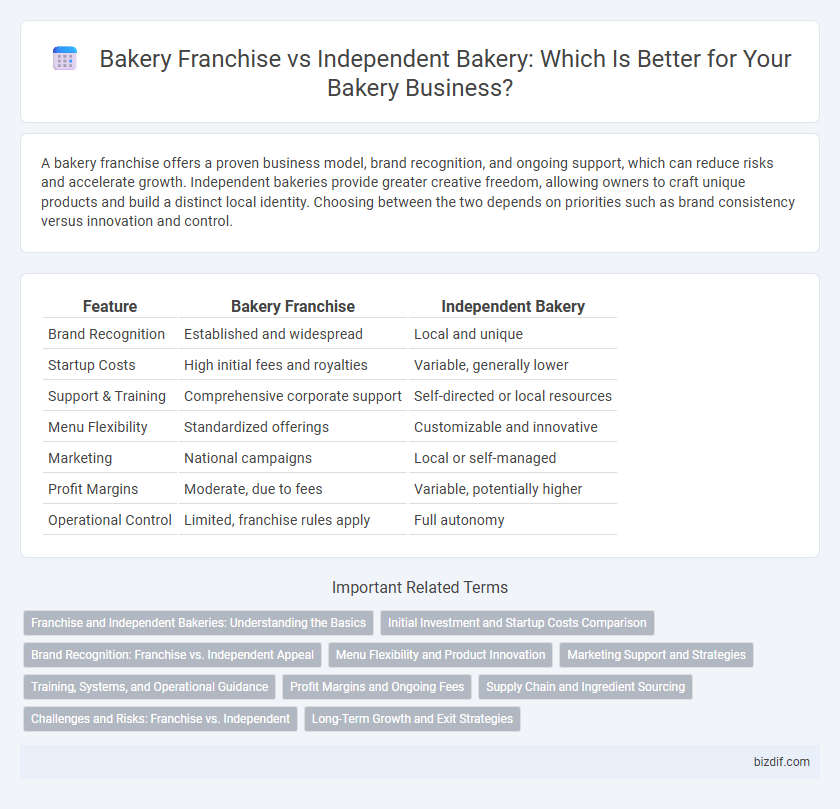A bakery franchise offers a proven business model, brand recognition, and ongoing support, which can reduce risks and accelerate growth. Independent bakeries provide greater creative freedom, allowing owners to craft unique products and build a distinct local identity. Choosing between the two depends on priorities such as brand consistency versus innovation and control.
Table of Comparison
| Feature | Bakery Franchise | Independent Bakery |
|---|---|---|
| Brand Recognition | Established and widespread | Local and unique |
| Startup Costs | High initial fees and royalties | Variable, generally lower |
| Support & Training | Comprehensive corporate support | Self-directed or local resources |
| Menu Flexibility | Standardized offerings | Customizable and innovative |
| Marketing | National campaigns | Local or self-managed |
| Profit Margins | Moderate, due to fees | Variable, potentially higher |
| Operational Control | Limited, franchise rules apply | Full autonomy |
Franchise and Independent Bakeries: Understanding the Basics
Franchise bakeries benefit from established brand recognition, standardized recipes, and comprehensive support systems, enabling faster market entry and consistent product quality. Independent bakeries offer greater creative freedom, allowing bakers to innovate unique recipes and tailor customer experiences, fostering local community engagement. Understanding these fundamental differences helps entrepreneurs decide between leveraging a proven business model or pursuing personalized artisanal opportunities.
Initial Investment and Startup Costs Comparison
Bakery franchises typically require a higher initial investment, ranging from $200,000 to $500,000, due to franchise fees, standardized equipment, and branded marketing expenses. Independent bakeries have more variable startup costs, often between $50,000 and $150,000, depending on location, equipment, and custom branding choices. Franchise operations benefit from established supply chains and training programs, which can reduce operational uncertainties compared to independently owned bakeries.
Brand Recognition: Franchise vs. Independent Appeal
Bakery franchises benefit from established brand recognition, attracting customers through consistent quality and widespread marketing efforts, resulting in higher foot traffic and trust. Independent bakeries often rely on local reputation, unique recipes, and personalized customer experiences to build brand appeal, creating a loyal niche market. While franchises leverage nationwide brand presence, independent bakeries capitalize on community connections and artisanal authenticity to differentiate themselves.
Menu Flexibility and Product Innovation
Bakery franchises offer standardized menus with limited flexibility to maintain brand consistency, often restricting local product innovation. Independent bakeries benefit from greater menu freedom, allowing them to experiment with seasonal ingredients and unique recipes that cater to local tastes. This flexibility fosters innovation and differentiates independent bakeries in competitive markets.
Marketing Support and Strategies
Bakery franchises benefit from established marketing frameworks, including national advertising campaigns, brand recognition, and digital marketing tools designed to drive customer traffic consistently. Independent bakeries often rely on localized marketing strategies such as community events, social media engagement, and personalized promotions to build a loyal customer base. Franchise marketing support typically includes training, CRM systems, and market analytics, enabling data-driven decision-making that independent bakeries may not have access to.
Training, Systems, and Operational Guidance
Bakery franchises offer comprehensive training programs, standardized systems, and continuous operational guidance to ensure consistency and efficiency across locations. Independent bakeries often lack structured training and formalized processes, relying on the owner's experience and ad-hoc methods. Franchise models streamline inventory management, marketing, and compliance, whereas independent bakeries benefit from greater creativity but face challenges in scaling operations and maintaining uniform quality.
Profit Margins and Ongoing Fees
Bakery franchises typically offer higher initial investment costs with ongoing fees such as royalty payments and marketing contributions, which can reduce net profit margins compared to independent bakeries. Independent bakeries often benefit from greater control over pricing and operational costs, potentially leading to higher profit margins but with increased financial risk and responsibility. Franchise models provide brand recognition and support that can stabilize revenue streams, while independent bakeries rely heavily on local customer loyalty and unique product offerings to maximize profitability.
Supply Chain and Ingredient Sourcing
Bakery franchises benefit from centralized supply chains that ensure consistent ingredient quality and bulk purchasing discounts, reducing costs and improving inventory management. Independent bakeries often rely on local suppliers, which can enhance ingredient freshness and uniqueness but may lead to higher prices and supply variability. Streamlined logistics in franchises facilitate faster restocking, while independents face challenges in sourcing specialty ingredients consistently.
Challenges and Risks: Franchise vs. Independent
Franchise bakeries face challenges such as strict adherence to brand guidelines and royalty fees that can limit operational flexibility and reduce profit margins. Independent bakeries encounter risks including limited brand recognition and higher marketing costs, making customer acquisition more difficult. Both models must navigate supply chain dependencies and fluctuating ingredient prices, but franchises benefit from bulk purchasing power while independents often struggle with scale.
Long-Term Growth and Exit Strategies
Bakery franchises offer structured long-term growth through proven business models, national brand recognition, and established supply chains, which can lead to faster scalability and more attractive exit opportunities like franchising resale or corporate buyouts. Independent bakeries rely on unique local branding, personalized customer loyalty, and niche market positioning, which can complicate growth but potentially increase value through strong community ties and bespoke product offerings. Exit strategies for independents often involve selling to local investors or evolving into specialty brands, while franchises benefit from standardized valuation methods and broader market appeal.
Bakery franchise vs Independent bakery Infographic

 bizdif.com
bizdif.com